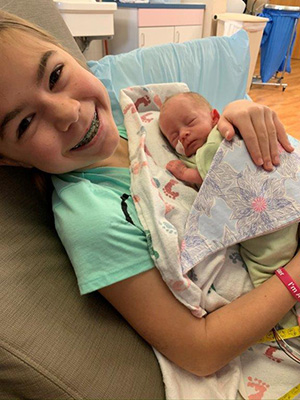After Shelea Crecy’s first daughter was born, she and husband Rocky made the decision to take some time before further growing their family. Shelea chose an intrauterine device (IUD) for birth control and left it in place for two years. But when the Crecys were again ready to conceive, time wasn’t on their side.
After two years went by with no success, Shelea was diagnosed with polycystic ovary syndrome, or PCOS. PCOS is a hormonal disorder that can cause female infertility in women of reproductive age. Shelea’s doctor put her on medication and the couple continued trying to conceive.
The Crecys weren’t in a financial position to undergo IVF, so they spent six more years trying other fertility options before admitting defeat. Shelea had made an appointment for another IUD to be put in. That’s when she learned she was pregnant.
Much like the journey to conception, Shelea’s pregnancy was complicated and considered high-risk. In her first trimester, she developed a subchorionic hemorrhage that led to spotting and bleeding. She also had preeclampsia to contend with.
Baby Crecy wasn’t without health problems as well, including hydronephrosis and intrauterine growth restriction (IUGR). A baby with IUGR grows slower than usual in utero and is small for their gestational age at birth.
As delivery day grew closer, Shelea’s doctors, Darrell Bowyer, MD, OB/GYN, and Amaryllis Maria Elpida Arraut, MD, maternal fetal medicine physician, on the medical staff at Texas Health Fort Worth, determined Shelea should be admitted for close monitoring and prenatal care.
“Everything was going along fine until my blood pressure started going up and would not come down. Nurses came in and had me change out of my clothes. They were moving quickly, and I began thinking my baby wasn’t going to make it. She was too little.”
“I was hoping we could deliver naturally, unfortunately my baby was breech so a C-section had to be done. They started me on magnesium and then a spinal block in the operating room. I couldn’t make myself relax. I was watching my blood pressure continue to rise, and I remember thinking I was going to die because my blood pressure got so high. When I heard Paisley cry, it was the best sound I had ever heard,” she adds.
 Baby Paisley was born 7 weeks early at 3 lbs., 1 oz. Shelea was able to see her just briefly before Paisley was moved to the hospital’s Level III Neonatal Intensive Care Unit (NICU) and mom was taken to a room in Labor and Delivery to be monitored for 24 hours. She was thankful to get pictures of her precious little one from Rocky, who was able to see Paisley when delivering milk to her in the NICU.
Baby Paisley was born 7 weeks early at 3 lbs., 1 oz. Shelea was able to see her just briefly before Paisley was moved to the hospital’s Level III Neonatal Intensive Care Unit (NICU) and mom was taken to a room in Labor and Delivery to be monitored for 24 hours. She was thankful to get pictures of her precious little one from Rocky, who was able to see Paisley when delivering milk to her in the NICU.
Care for Whatever Comes
The next 45 days would be rather rough, Shelea admits. Paisley would need that time to grow and develop in the NICU, and Shelea would need the time to recover from her surgery and learn to cope with the family’s NICU journey. The really hard days were when Shelea’s blood pressure would get high and she would have to stay in Antepartum rather than go be with Paisley. When she was finally discharged from the hospital, the new mom had mixed emotions about having to leave her sweet daughter.
“It was rough, but I feel like we were lucky because our baby didn’t need oxygen,” she says. “Paisley was very healthy considering her tiny size. Still, it was hard not being able to be with her and bring her home. When you go to visit your baby, you see all these babies going home. You’re happy for them. And then you step off of the elevator and go into the NICU. It’s a hard journey, especially with an older child that you have to care for too. So you try to split your time evenly between home and hospital.”
Shelea relied on the nurses and staff members she loving calls “superheroes” to provide the right support and guidance. “Amber, Rebecca, Kyra, Brad, Ashley and Lexi were all so amazing. They would sit down with me and try to calm me. Amber especially helped me see that I was suffering from postpartum depression and made sure I got the help I needed,” she recalls.
With their maternity experience now behind them, Shelea offers some advice to moms who are just starting on their NICU journey: “It’s hard but those babies, those teeny tiny babies, are fighters. They are the strongest little humans I have seen. Celebrate the victories, weight gain, eating on their own, passing the car seat test. All of the victories matter. None of them are small!”
Note: Shelea’s help for her postpartum depression included understanding that she needed to talk about her anxiety and feelings of guilt. When she finally told her doctor about her situation, she got the medication she needed to help her. She slowly started becoming herself again, and being more present for her older daughter. Shelea reports that she is now medication free and “even more herself”.
If you are a new mom struggling with anxiety, depression or disinterest in what matters, Texas Health Behavioral Resources are offered at 18 locations throughout North Texas. For additional information or to find resources, call (682) 626-8719.
To learn more about maternal care at Texas Health, visit TexasHealth.org/Moms.

